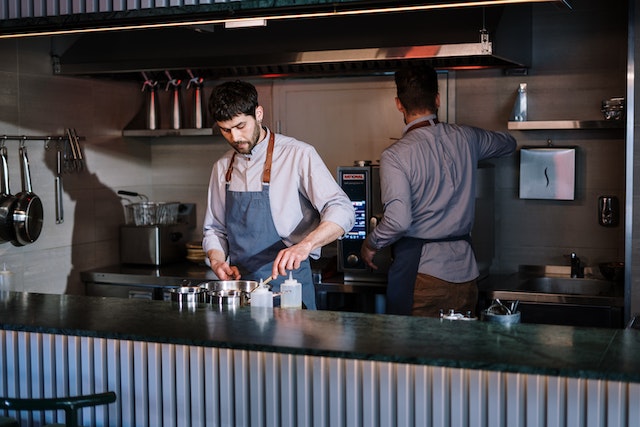Blogs
What Does Due Diligence Mean in Food Hygiene?
From Operational Reserves through to Reliefs & Deferrals, Smart, Reforecasting, Repurposing and our particular favourite – Workation - there are so many buzz phrases for restaurateurs to remember. But have you heard of Due Diligence? No, not financial due diligence, we mean due diligence in respect of restaurant food safety. Here’s the run-down on another phrase to remember.
So, what does "due diligence" mean when protecting our food against bacteria and toxins? Well, let's break it down.
Due diligence means taking steps to ensure food is safe from bacteria and toxins and fit for consumption. Obviously the golden rule is that customers should never get sick from eating in restaurants which is why food businesses must have a plan to keep products secure.
So, what steps should restaurants take to ensure food safety? Actually, it is all about identifying potential hazards, such as bacteria or toxins that could make people sick, then implementing controls to stop their spread. Finally, the these controls' performance are closely monitored, fixing any problems immediately should any arise and keeping records detailing all steps taken towards keeping us healthy.
Restaurants must review and adjust their safety procedures as necessary to stay abreast of potential new hazards that might present themselves and ensure that they're always doing everything possible to keep customers safe.
How Can Due Diligence Assist with Food Safety?
Imagine having food protected from all sorts of potential risks by an invisible superhero - that's what due diligence does. It helps ensure the food remains secure so diners can enjoy their meal without worry.
The best practitioners of due diligence do this by selecting food suppliers with proven supply chain integrity to ensure food is grown or raised safely and prepared correctly. It is then transported using surgically clean vehicles to prevent it from becoming contaminated and finally, once at its destination, it is stored properly so it remains fresh and safe to eat.
Food suppliers ensure safety from start to finish by performing all these actions.
What Are The Key Elements of Food Safety Due Diligence?
Food safety due diligence is like an invisible code followed by businesses to ensure the food is free from toxins, pathogens and other nasties.
One key component of due diligence is having a solid plan in place. Restaurants need rules and procedures that everyone follows to ensure the food remains safe for consumption, with periodic checks conducted to ensure everything runs smoothly and any discrepancies are resolved quickly.
What Are the Advantages of Food Safety Due Diligence?
Did you know that being diligent with food safety brings many advantages? It's like receiving a reward for all the hard work food businesses put into keeping the meals safe and delicious.
First and foremost, food safety audits help increase food safety. By inspecting for hazards and eliminating them as much as possible food audits help people enjoy safe meals more often without the risk of illness.
Due diligence also aids businesses in meeting their legal responsibilities. Food processing plants must abide by specific rules to keep the food safe, and due diligence helps them do just that.
Oh, and one more benefit - it enhances a restaurant's reputation! When restaurants demonstrate they care about their customer's safety by practicing due diligence, their customer trust increases significantly, and customer advocacy increases.
Did we mention that the efficiency of your restaurant increases, too? Doing things correctly from the beginning can prevent recalls and other costly actions - freeing staff up to focus on doing what they do best instead of dealing with issues.
How Can I Implement Due Diligence into My Food Safety Program?
Want to ensure everyone can safely enjoy their meals? To do so, implementing due diligence is the solution and it won't be as complicated as you think.
First and foremost, due diligence means taking every necessary step to keep food safe. That means handling it appropriately, using approved and safe ingredients, and having established food safety procedures that work.
Remember that you're not on this journey alone. Resources, such as Food Standards Agency, are available to guide and assist with food safety compliance. According to them, due diligence means taking all reasonable measures to ensure food is safe, including conducting regular food safety audits.
So, begin by reviewing your food handling practices. Are you adhering to all the best practices regarding washing hands, using clean utensils, and storing food properly? Ensure you're doing everything possible to keep food free from contamination and clean!
First and foremost, be certain that all ingredients used in your recipes are safe and approved by authorities for consumption by your customers. Ensure all the products will not cause harm or discomfort to them.
Create and follow food safety procedures. These protocols should detail steps to ensure food safety, such as temperature controls, cleaning routines, and how you handle and prepare the food. Ensure your team understands and adheres to these policies for everyone's good.
Implementing due diligence into your food safety program demonstrates that you care deeply for the well-being of your customers, all thanks to that invisible superhero!
Also Read - Flying Insects Usually Gain Access to Food Premises?
Book your demo today!
Favouritetable is contemporary, easy to use restaurant management software designed to increase bookings, efficiency, revenue and profits. Loved by restaurateurs and UK-based, it's the best value next-generation restaurant management software on the market.
Choose an online demo with a real person, or try the system at your own pace with a demo account.
Photo by cottonbro studio: https://www.pexels.com/photo/man-in-white-dress-shirt-standing-beside-man-in-black-vest-4253303/




